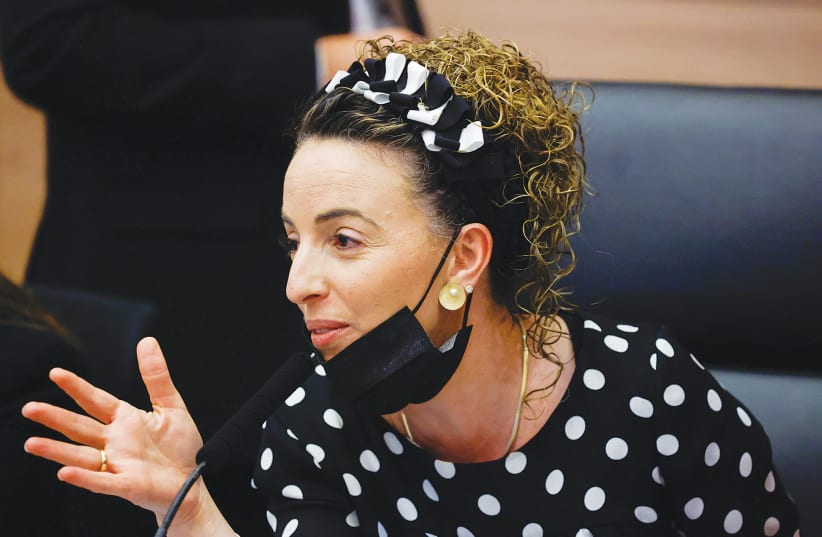Six months ago, I wrote about the tremendous gap between the many government declarations on the need for fair representation and gender equality in formulating foreign and defense policy, and their implementation. Israel’s 36th government, calling itself the “change government,” is indeed a harbinger of change in terms of gender representation; a shift with potential opportunities for integrating a gender perspective into the formulation of foreign and defense policy.
Article 30 of the new government’s guidelines states that the government “will act to achieve full social equality between men and women.” While this language is general and vague, initial government appointments certainly offer a promising beginning. This is a diverse government in terms of gender, with a record of nine women ministers, six chairs of Knesset committees, two deputy Knesset speakers and a chairwoman of the coalition (for only the second time in Israeli history) – an encouraging number of women serving in key posts.
Three women have also been appointed to the security cabinet (a record), three women ministers have portfolios directly related to foreign policy (energy, environmental protection, innovation and science), and a woman chairs one of the subcommittees of the Foreign Affairs and Defense Committee. This is undoubtedly an improvement, but it is still not sufficient.
Unfortunately, even in 2021, such changes cannot be taken for granted. Despite Israel’s (allegedly) positive approach toward UN Security Council Resolution 1325, which calls for representation of women in decision-making on issues of peace and security, and the promise of “appropriate” representation for women in decision-making roles anchored in Israeli law, women’s presence in executive and leadership positions is sorely lacking. We saw women marginalized and excluded over the past year from substantive decision-making forums, such as the coronavirus cabinet. Righting these wrongs, which undermines not only gender equality but also national security, must be a top priority.
APPOINTMENTS ARE not the only solution. Integration can manifest itself in budgets, legislation, government planning and more. Conceptual changes are also a must; not only should the number of women in key positions be increased, but decision-making and strategic forums must be imbued with a clear gender perspective. Integration of a gender perspective is a strategic tool in policy planning and resource allocation, recognizing the different needs and viewpoints of women and men.
While the appointment of women to top positions does not automatically guarantee integration of a gender perspective, the more women who fill management and decision-making positions, the more who will presumably express a comprehensive view of the needs and challenges facing diverse populations. Women’s appointments to top bureaucratic posts will also advance the opportunity for such change. Ten women will serve in the new government as directors-general of ministries (the office of the alternate prime minister and ministries of transportation, environmental protection, agriculture, diaspora affairs, regional cooperation, innovation and science, social affairs and social services, social equality, and communications) compared to four in recent years.
Proactive measures are also required to achieve change, with civil society often leading the way. Forum Dvorah, an NGO for the advancement of women in foreign policy and national security, has been energetically linking women to top vacant positions by disseminating information about vacancies on the forum’s experts’ network, sending out candidate resumes and encouraging qualified women candidates to apply. Other civil society organizations are also active in this regard, chief among them Itach – Women Lawyers for Social Justice, and the Rackman Center for the Advancement of Women, which petitioned the Supreme Court demanding equal representation of women on the COVID-19 advisory committee of the National Security Council (NSC). The Bar Association also petitioned the Supreme Court against discrimination of women on the COVID-19 cabinet.
Forum Dvorah CEO Tanyah Murkes recently joined the NSC’s permanent advisory committee on integrating gender perspective into recommendations for national policy on states of emergency.
“The makeup of the advisory council recognizes the different needs of women from different population groups in Israeli society during states of emergency,” she says. “Women and men committee members will compile a body of knowledge and infrastructure recommendations to serve as guidelines for formulating recommendations. The committee understands that the diversity of voices and expertise on issues relevant to women’s lives in states of emergency will result in more precise decisions, closer cooperation and sharing of relevant knowledge and experience, and in implementation of government resolution 2331 of 2014 that urges integration of gender perspective in government measures, including planning, budget allocation and policy-making.”
These efforts constitute initial steps on the long road to a fundamental change in strategic decision-making forums, not just in the quantity of representation but also in terms of substantive action, and might open the door to gender perspective shaping Israel’s foreign and defense policy.
The writer is the COO of Mitvim Institute and a member of Forum Dvorah.
